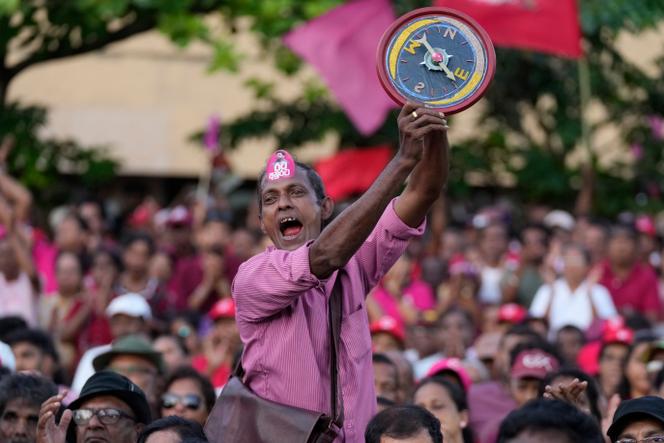


Night fell on Colombo, bringing a little coolness. For hours, thousands of Sri Lankans had been waiting in the monsoon humidity for "AKD," the candidate of the left and the unexpected favorite in the presidential election race. On Wednesday, September 18, Anura Kumara Dissanayake held his last rally of the campaign.
At the back of the compact crowd, Priyantha Abeyratne's eyes were full of hope. "I'm nearly 70, and this may be the last time I vote. I intend to do what's right for the country," said the retired lawyer. His life, he said, is relatively comfortable, but his income is insufficient to meet daily needs. He suffers, like most Sri Lankans after five years of a never-ending crisis. In Colombo, and all over the country, young people, women and the elderly are wearing burgundy-red T-shirts in the colors of this charismatic Marxist candidate, who has chosen a compass as the symbol of his campaign.
Two years after ousting the Rajapaksa clan from power, citizens are being called to the polls on Saturday, September 21, to choose between 38 candidates. The island of 22 million inhabitants may well be preparing to begin a new chapter in its citizen revolution.
In 2022, after months of shortages of essential goods – gas, electricity, food and medicines – a massive popular protest movement, the Aragalaya ("struggle"), spread across the island, demanding the departure of President Gotabaya Rajapaksa, who is considered responsible for the bankruptcy of South Asia's most developed country, unable to repay the abysmal debt accumulated through erratic investment and calamitous management. On July 13, 2022, the leader was forced to flee the country, driven out by the people. He has since returned, staying in a plush Colombo residence put at his disposal by the government.
His successor, 75-year-old Ranil Wickremesinghe, appointed by Parliament with the support of the Rajapaksa camp, finalized a rescue plan with the International Monetary Fund (IMF) in March 2023 for a $2.9 billion loan. This experienced man, who has already been prime minister six times, has stabilized the economy. Inflation has fallen below 5%, growth has returned – 5.3% in the first quarter and 4.7% in the second – after two years of sharp contraction. Foreign exchange reserves are also slowly being rebuilt and the public deficit is decreasing.
Lines several kilometers long to obtain gasoline or a bottle of gas are a thing of the past, as are the interminable power cuts. But Wickremesinghe's austerity policy, dictated by the IMF, has an astronomical social cost. Between 2022 and 2023, 300,000 business leaders, doctors, engineers, nurses and academics have fled the country in droves.
You have 69.68% of this article left to read. The rest is for subscribers only.
